The Complete Works of Thomas Manton (22 vols.)
Digital Logos Edition
Overview
The Complete Works of Thomas Manton (22 vols.) contains all of Manton’s writings and treatises, along with nearly one thousand sermons on law and grace, justification and sanctification, faith and works, and other theological topics central to the theology of the Reformation and the spirit of Puritanism. Thomas Manton devoted his life to preaching and teaching, and devoted his sermons to a verse-by-verse exposition of Scripture, uncovering the specific meaning for his listeners. He preached hundreds of sermons on Romans 8, Psalm 119, Ephesians 1, Hebrews 11, the book of 1 John, the prayer of Jesus in John 17, and countless other sermons from nearly every book of the Bible—often devoting multiple sermons to a single verse of Scripture.
Logos is pleased to bring you the electronic edition of the Complete Works of Thomas Manton—now available in digital format as a complete set for the first time ever! These volumes were first published as a print collection beginning in 1870, but this mammoth set has been rarely reprinted since then and is cumbersome to use.
The Logos edition of the Complete Works of Thomas Manton makes Manton’s sermons, treatises, and expositions of Scripture easier to use and more accessible than ever, allowing you to get straight to the theology and the Scripture you’re studying without fumbling through volumes upon volumes of print material. What’s more, with Logos, the thousands of Scripture texts in Manton’s sermons are linked directly to the Scripture texts in your digital library. The advanced search tools help you navigate more than 13,000 pages of material instantly, and hyperlinks in the table of contents take you exactly where you need to go. With the power and speed of your digital library, the Complete Works of Thomas Manton is accessible like never before for study, sermon preparation, reading, and research.

- Nearly 1,000 sermons
- Two biographies of Thomas Manton
- 200-page subject index
- Scripture references are linked to your original language Bible texts and English translations
How hard and successful a student he was, and how frequent and laborious a preacher, and how highly and deservedly esteemed; all this, and more, is commonly known.
Ministers who do not know Manton need not wonder if they are themselves unknown.
The fertility of his mind seems to have been truly astonishing. Every page in his books contains many ideas . . . I regard Manton as a divine of singularly well-balanced, well-proportioned, and scriptural views. . . . As an expositor of Scripture, I regard Manton with unmingled admiration.
Perhaps few men of the age in which he lived had more virtues and fewer failings.
—William Harris
- Title: The Complete Works of Thomas Manton (22 vols.)
- Author: Thomas Manton
- Publisher: James Nisbet & Co.
- Volumes: 22
- Pages: 10,981
This title is included in the following collections
You can save when you purchase this product as part of a collection.
Puritan Ultimate Collection (1...
$1,099.99$1,099.99Logos 7 Reformed Platinum Lega...
$1,499.99$1,499.99Biblioteca Colecionador 2025
$3,499.99$2,799.99Logos 7 Reformed Diamond Legac...
$2,999.99$2,999.99
- $2,999.99
- $2,999.99
- $4,749.99$3,562.49
- $4,749.99
- $4,749.99
- $4,749.99
- $4,749.99
- $12,102.39$7,299.99
- $11,399.99
- $11,399.99
- $11,399.99
- $23,999.99$17,999.99
- $21,749.99
- $24,999.99
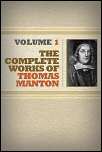
Volume 1 begins with a biographical memoir of Thomas Manton by William Harris, which traces the formative events of Manton’s childhood and education. The remainder of Volume 1 contains a 253-page line-by-line exposition of the Lord’s Prayer, seven sermons on the temptation of Christ, seven sermons on the transfiguration of Christ, and seven sermons on Christ’s eternality.
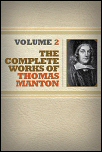
The second memoir of Thomas Manton, “An Estimate of Manton,” by J. C. Ryle, found at the beginning of Volume 2, offers an introduction to Manton’s theology, along with his relationships with his political and theological contemporaries. This volume also includes ten discourses on morality, perfection, wisdom, saving faith, and other subjects, along with twenty-four sermons.
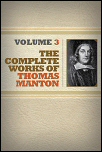
Volume 3 contains eighteen sermons on 2 Thessalonians 2, in which Manton encourages his listeners to stand firm and prepare—in hope—for the day of the Lord. The second half of Volume 3 contains “A Practical Exposition Upon the Fifty-Third Chapter of Isaiah,” in which he peels back the theological, pastoral, and practical implications of the life and death of the Suffering Servant.
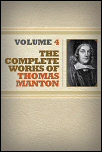
In addition to his sermons, Manton is perhaps best known for his detailed commentary on the book of James, which he finds “full of useful and practical matter.” He affirms its divine authority, its canonicity, and its catholicity, paying particular attention to Luther’s objections to James. James, more than any other book, shows the church that “faith is not an idle grace.”
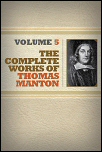
The epistle of Jude speaks against false prophets, pseudo-Christianity, and those speaking against religion in general and Christianity in particular. The political and theological challenges of seventh century England prompted Manton to write his commentary on Jude. This 376-page verse-by-verse commentary outlines the central themes, the historical significance, and the practical application of this important epistle.
Volume 5 concludes with four lengthy sermons on holiness, baptism, salvation, and Scripture.
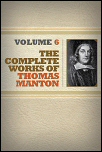
Thomas Manton praised the Psalmist for his succinctness, for avoiding obscurity, and for “advancing practical holiness.” Psalm 119, for Manton, captures these attributes better than perhaps any other. Throughout his lifetime, he wrote more than a hundred sermons on Psalm 119. This volume—the first of three on Psalm 119—contains the first fifty-two sermons which explore law, grace, and the Word of God.
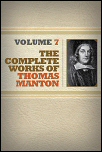
Volume 7 continues Manton’s 3-volume work on Psalm 119. These fifty sermons explore at length the notion of delighting in God’s law, the memory of God’s work, and God’s mercy.
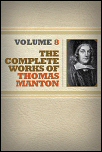
Volume 8 contains Manton’s sermons on Psalm 119:98–141, in which the Psalmist wrestles with the love of the law and the help of God needed to keep it. Manton also explores the themes of justice and mercy.
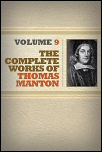
Volume 9 concludes Manton’s sermons on Psalm 119, with sermons on verses 142 through 176. The second half of this volume is devoted to a detailed exposition of the Parable of the Ten Virgins and the Parable of the Talents.
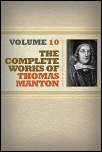
Volume 10 concludes Manton’s exposition of Matthew 25, with sermons on the contrast Jesus draws between the sheep and the goats. This volume also contains thirty-two sermons on Jesus’ prayer for himself and Jesus’ prayer for his disciples in John 17.
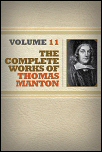
Volume 11 concludes Manton’s exposition of John 17 with thirty sermons on Jesus’ prayer for all believers. The second half of this volume is devoted to a lengthy collection of sermons on Romans 6 and the first part of Romans 8. These sermons explore many key Pauline themes, such as the contrasts between grace and the law, between the flesh and the spirit, and between death in sin and life in Christ.
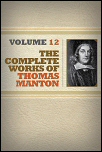
This volume concludes Manton’s exposition on Romans 8, with thirty-seven sermons devoted to the work of the Holy Spirit, the groaning of creation, and the hope of salvation. The second half of Volume 12 is devoted to a detailed exposition of 2 Corinthians 5.
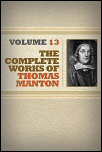
Volume 13 continues Manton’s exposition of 2 Corinthians 5 with thirty-two sermons, including four sermons on verse four alone. This volume concludes with sermons on Hebrews 11, which explore the means of knowing God through faith, evidence, and understanding.
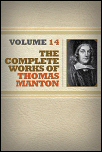
In Volume 14, Manton continues his series of sermons on Hebrews 11, exploring the role of faith in the lives of Abraham, Isaac, Jacob, Moses, and Noah. This detailed exposition also defines the riches of Christ and the anticipation of the fulfillment of all things in Christ.
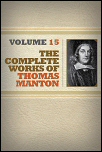
Volume 15 concludes Manton’s exposition of Hebrews 11, with sermons on the faith of the Israelites crossing of the Red Sea, the conquest of Jericho, and the life of Rahab. This volume also includes two treatises—“A Treatise on the Life of Faith” and “A Treatise on Self-Denial”—along with eighteen sermons preached on special occasions, including a sermon preached before Parliament and three sermons on the sacraments.
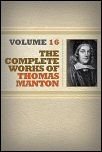
Volume 16 contains sermons on a variety of subjects and texts, including:
- Twenty-two sermons on Titus 2:11–14
- Four sermons on Hebrews 6:18
- Four sermons on John 14:1
- Two sermons on Luke 12:48
- A sermon on Deuteronomy 32:51
- A sermon on Acts 17:30–31
- Seven sermons on Mark 10:17–27
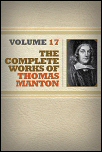
Volume 17 continues Manton’s collection of sermons on a variety of subjects, including:
- Eight sermons on Mark 10:17–27
- Four sermons on 2 Thessalonians 1:3
- Numerous sermons on texts from Matthew, John, and Romans
- Two sermons on Exodus 4:21
- A sermon on Genesis 3:15
- Ten sermons on Genesis 21:63
- Fourteen other sermons on numerous Old and New Testament texts
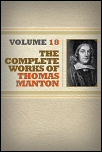
Volume 18 contains an array of sermons from nearly every book in the Bible. This collection of sermons covers the law of God, the emptying of Christ, God’s compassion, self-control, as well as numerous other topics.
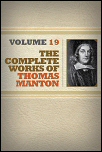
The first half of Volume 19 is devoted to Manton’s sermons on a variety of difficult texts from the Gospels, Ecclesiastes, Revelation, Leviticus, 1 Corinthians, and 2 Corinthians. This volume concludes with thirty-two sermons on Ephesians 1.
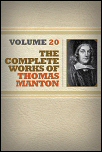
Volume 20 contains sermons on important New Testament texts, including nineteen sermons on Philippians, sixteen sermons on 2 Thessalonians 1, thirteen sermons on 1 John 2–3, and sermons on Matthew 22:14, Mark 7:37, 2 Corinthians 4:17, and other texts.
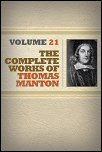
In this volume, Manton continues his exploration of Scripture, with dozens of sermons on seven texts:
- Twenty-five sermons from 1 John 3
- Seven sermons on Acts 2
- Four sermons from 1 Peter 1:23
- Six sermons on Psalm 19:13
- Five sermons on Psalm 131
- Two sermons from Ezekiel 18:23
- One sermon on Jeremiah 45:5
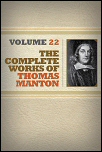
Volume 22 contains eleven sermons from 2 Samuel, Job, Psalms, Proverbs, and several New Testament texts. The final part of this volume contains the sermon preached by William Bates at Thomas Manton’s funeral, and contains perhaps the most vivid biographical account of Manton’s life and work.
This volume also contains a 200-page subject index for the entire 22-volume collection.
Thomas Manton was born in 1620 in Somerset, England. He attended Oxford University, and graduated in 1639. At age 19, he was ordained as a deacon, and became the town lecturer of Collumpton in Devon. He began preaching at St. Mary’s Church in 1644, and became lecturer at Westminster Abbey in 1656. He also participated in the Westminster Assembly and preached before Parliament.
In 1662, Manton was forced to leave the Church of England for nonconformity. He was imprisoned—as were many Puritans—in 1670 for preaching illegally. He also crafted the Fundamentals of Religion with Richard Baxter during this time. Throughout his lifetime, Thomas Manton was a devoted follower and ardent defender of Reformed theology. He died in 1677.
Reviews
25 ratings
Mac McClanahan
8/26/2023

Maxim Farocanag
6/24/2023
David pauley
5/10/2020

Kevin Bratcher
6/12/2018
Allan Story
5/5/2017

Matthew John Buttner
4/5/2016
I would love to own this...wish I had known about it when it was pre-pub. Six hundred dollars!
Larry Liddiard
12/25/2015

Justin D. Hoke
8/22/2015

daren dirksen
12/29/2014
Scott R. Wright
12/11/2014